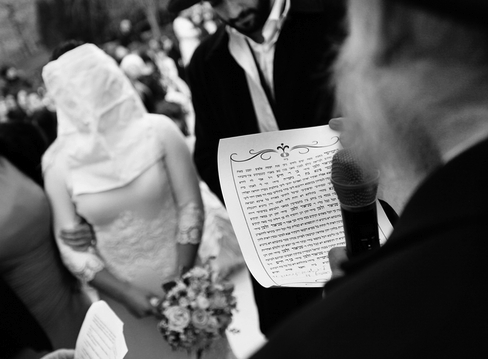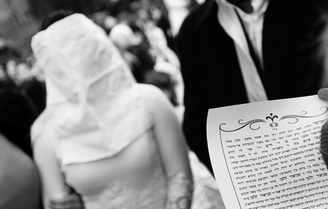From a Legal Hasidic Jewish Wedding to Unrecognized Love in Texas
Weddings. Strange how they can spell fantasy fulfillment, happily ever after, Cinderella nevermore. Advertisers in the $40-billion-a-year industry know the unconscious pull: Ads for wedding-related services constantly refer to fantasies and hopes and dreams. In my city (Houston) the enormous twice-annual Bridal Extravaganza features providers with names like Who Made the Cake and Dream Bouquet. (My favorites are the health and fitness outfits they tout like Plexus Slim and Norris Plastic Surgery. Your body will fit your dream image in time for the wedding, no problem!) A scan of the website turns up lines like: You can have a royal wedding. Fantasy wedding. Destination wedding, because you have truly arrived. We will create the wedding of your dreams! Single words recur: Princess. Queen. Pleasure. Abundance. Beautiful, beautiful you. The word “bride” comes out like a dreamy sigh.
Recently, a Yahoo headline read “Four-Year-Old Volunteers to be Flower Girl at New York City Hall.” The story was about a mother who helped her daughter fulfill her dream by letting her hold a handmade sign at City Hall offering to be a flower girl for weddings. Sure enough, one couple asked her to do it. But who planted that dream in the child? And more importantly, why?
***

One hot summer night a month after my nineteenth birthday, I stood beneath a wedding canopy about to enter an arranged marriage to a man I barely knew. We were both new to the Hasidim; his beard was still filling in, his long black coat still stiff. My body was completely covered in a modest white gown, my face hidden beneath a thick veil. Literally and figuratively, I had been led blind to the canopy.
Among the Hasidim, weddings were extravagant events filled with elaborate food and decorations, frenzied music, and dancing through the night. A wedding was life’s first most important goal. Children played at making weddings, families went deep into debt for them. The couple was achieving God’s purpose: to build a religious household and raise a new generation, upholding the community of God.
So, in that world, a wedding was a powerful symbol of fulfillment, duty, membership, ancient connection, symbol of God’s love.
Which all just goes to say that my past gives me a little bit of a different view of weddings. I find it startling that out here in the world the words “wedding” or “marriage” are also highly charged, as if here, too, they evoke all kinds of unspoken desires and obligations, or a need to fulfill some forgotten dream. Jung would say that weddings and marriage form an archetype, an ancient image embedded in our psyches that can compel us in ways we may not even understand.
***
One night during my first real love affair after I left that community, my lover straddled me and then lifted the bed sheet out and above us, creating a little tent over two naked lonely women. Ufros aleinu, she sang out. I dropped my jaw. She had just quoted the liturgy for the wedding ceremony, asking God to spread out over us a canopy of peace. She had dared apply wedding words to us. That moment was the first time I imagined a wedding that I chose and that fit me, one in which I was conscious, and could actually see. I saw myself walking down the aisle clear-eyed and unaided, straight toward the woman of my dreams.
****
All these years later, the irony for my Susan and me is that we live in Texas, which of course means that after nearly 10 years together we aren’t married. But I think life in a relationship outside of marriage has woken me up from the wedding dream. It’s a new delight each morning to open my eyes and find the person I love lying next to me, and know that, unbound by any legal document, she’s there only because she wants to be, as am I. I love how real and simple and fragile that is.
Disconnected from dreams, fantasies, hopes, well, the idea of marriage isn’t the same. I don’t want either of us feeling stuck. Financially, it can be complicated. Most days, I don’t see the point.
And yet, when Texas finally comes around, we probably will make a wedding. We’ll be gray-haired brides. We’ll do it for societal validation, and shared joy, and because that whispered need/desire/hope for at least symbolic fulfillment is somehow part of our being human, even though I never did dream as a child of being a flower girl. We hope to resist the promises of advertisers and make ours a simple, beautiful and quite conscious ceremony among friends, one that comfortably reflects us in all our quirky ways.
Leah Lax lives in Houston with her partner Susan and their dog, Gracie. Her memoir, Uncovered: How I left Hasidic Life and Finally Came Home, is available at amazon.com. Find out more about her at leahlaxauthor.com.
Photo: Mazel Moments
































